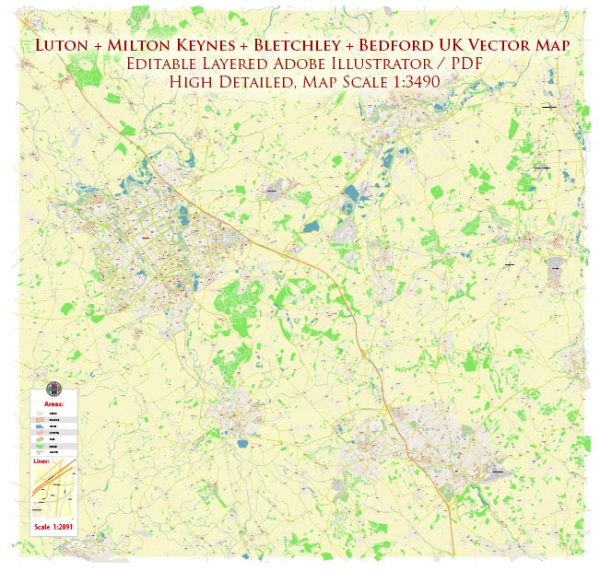Luton, Milton Keynes, Bedford, and Bletchley are all towns located in the South East of England, and each has a unique history of urban development.
- Luton:
- Luton has a history dating back to the medieval period, and its development was influenced by its strategic location on the River Lea. The town grew as a market town for the surrounding agricultural area.
- In the 19th century, Luton became known for its hat-making industry, which significantly boosted its economy and population. The town’s industrial growth led to the expansion of residential areas and infrastructure.
- The 20th century saw further industrialization, and Luton became a major center for car manufacturing, particularly with the presence of Vauxhall Motors.
- Milton Keynes:
- Unlike many towns in the UK, Milton Keynes is a relatively modern creation. It was designated as a “new town” in 1967 with the goal of relieving housing congestion in London and promoting balanced regional development.
- The town was planned with a grid system of roads, extensive green spaces, and a mix of residential, commercial, and industrial areas. Milton Keynes aimed to be a balanced, self-contained community with a focus on modernity and efficiency.
- Milton Keynes has experienced significant population growth, and its development has been characterized by the careful planning of infrastructure, parks, and amenities.
- Bedford:
- Bedford has a rich history that can be traced back to medieval times. It was an important market town and river port along the River Great Ouse, contributing to its economic growth.
- The town played a role in the industrial revolution, with the development of industries such as brewing and engineering. This period saw an expansion of the town’s infrastructure and housing.
- Bedford continued to evolve in the 20th century, facing challenges and opportunities associated with urbanization and industrial changes.
- Bletchley:
- Bletchley is historically known for Bletchley Park, the site where the Enigma code was decrypted during World War II. This played a crucial role in the Allied victory. Bletchley Park’s importance during the war contributed to the growth and development of the surrounding area.
- Post-war, Bletchley, like many towns, experienced expansion and changes in its economy. The development of technology and industrial sectors played a role in shaping its urban landscape.
Overall, the urban development of these towns reflects the broader historical and economic trends in the UK, including industrialization, technological advancements, and changes in transportation. Each town has its unique story, influenced by its geographical location, economic activities, and historical events.


 Author: Kirill Shrayber, Ph.D. FRGS
Author: Kirill Shrayber, Ph.D. FRGS